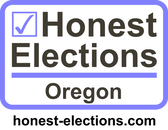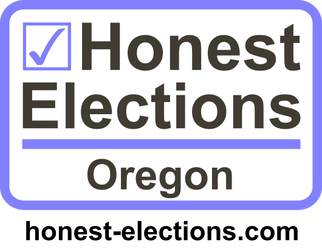
Oregon Supreme Court Upholds Constitutionality of Limits on Political Campaign Contributions
April 23, 2020
Decision reverses 1997 case, validates contribution limits adopted by Multnomah County voters in 2016; same limits were adopted by Portland voters in 2018
April 23, 2020
Decision reverses 1997 case, validates contribution limits adopted by Multnomah County voters in 2016; same limits were adopted by Portland voters in 2018
Today the Oregon Supreme Court expressly reversed a 23-year old precedent and upheld the constitutionality of limits on political campaign contributions. The limits at issue were those adopted by Multnomah County voters (by an 89% "yes" vote) in 2016 as Measure 26-184.
The voters of Portland enacted a similar measure (Measure 26-200) in 2018.
The decision is posted on the Oregon Supreme Court website.
Multnomah County Measure 26-184 was drafted and initiated by Honest Elections. James Ofsink, one of the parties in the case and an Honest Elections organizer, said, "It is encouraging tat the Oregon Supreme Court has joined the other 37 other states with free speech clauses like Oregon's in recognizing that those clauses do not shield campaign contributions from limitations."
Jason Kafoury, another party and organizer, noted, "The $500 contribution limits in Multnomah County and Portland are now in effect and fully enforceable. We will seek enforcement of those limits."
As expected, the Court invalidated the limits on political expenditures in the Multnomah County measure, as those limits would not pass muster under the Citizens United decision of the United States Supreme Court.
The Court reversed the Multnomah County Circuit Court decision striking down the contribution limits and remanded to that court to consider arguments under the First Amendment. "We are not at all worried about that," said attorney Dan Meek. Limits similar to the Multnomah County and Portland limits have been routinely upheld under the First Amendment, including in decisions of the Ninth Circuit Court of Appeals in 2017 and 2018. The Ninth Circuit stated in 2018:
Moreover, although the $500 limit is on the low-end of the range of limits adopted by various states, it is not an outlier. At least four other states (Colorado, Kansas, Maine, and Montana) have the same or lower limit for state house candidates, as do at least five comparably sized cities (Austin, Portland, San Francisco, Santa Cruz, and Seattle). We recently upheld a comparable limit [Montana].
Multnomah County Measure 26-184 was challenged in court by business associations, including the Portland Business Alliance, the Portland Metropolitan Association of Realtors, and Associated Oregon Industries. The measure was defended by the group of citizens who drafted the measure and led the fight for its adoption: Elizabeth Trojan, Moses Ross, Juan Carlos Ordonez, David Delk, James Ofsink, Ron Buel, Seth Woolley, Jim Robison and Jason Kafoury, all represented by attorneys Dan Meek and Linda Williams.
Measure 26-184 includes 2 key reforms to elections for public office of Multnomah County:
The good reasons for adopting campaign finance reform in Oregon are presented in the NEEDCFR.PDF document available at HE Validation (http://bit.ly/multvalid).
For more information:
Dan Meek[email protected]503-293-9021
Jason Kafoury[email protected]202-465-2764
For more information: honest-elections.com
The voters of Portland enacted a similar measure (Measure 26-200) in 2018.
The decision is posted on the Oregon Supreme Court website.
Multnomah County Measure 26-184 was drafted and initiated by Honest Elections. James Ofsink, one of the parties in the case and an Honest Elections organizer, said, "It is encouraging tat the Oregon Supreme Court has joined the other 37 other states with free speech clauses like Oregon's in recognizing that those clauses do not shield campaign contributions from limitations."
Jason Kafoury, another party and organizer, noted, "The $500 contribution limits in Multnomah County and Portland are now in effect and fully enforceable. We will seek enforcement of those limits."
As expected, the Court invalidated the limits on political expenditures in the Multnomah County measure, as those limits would not pass muster under the Citizens United decision of the United States Supreme Court.
The Court reversed the Multnomah County Circuit Court decision striking down the contribution limits and remanded to that court to consider arguments under the First Amendment. "We are not at all worried about that," said attorney Dan Meek. Limits similar to the Multnomah County and Portland limits have been routinely upheld under the First Amendment, including in decisions of the Ninth Circuit Court of Appeals in 2017 and 2018. The Ninth Circuit stated in 2018:
Moreover, although the $500 limit is on the low-end of the range of limits adopted by various states, it is not an outlier. At least four other states (Colorado, Kansas, Maine, and Montana) have the same or lower limit for state house candidates, as do at least five comparably sized cities (Austin, Portland, San Francisco, Santa Cruz, and Seattle). We recently upheld a comparable limit [Montana].
Multnomah County Measure 26-184 was challenged in court by business associations, including the Portland Business Alliance, the Portland Metropolitan Association of Realtors, and Associated Oregon Industries. The measure was defended by the group of citizens who drafted the measure and led the fight for its adoption: Elizabeth Trojan, Moses Ross, Juan Carlos Ordonez, David Delk, James Ofsink, Ron Buel, Seth Woolley, Jim Robison and Jason Kafoury, all represented by attorneys Dan Meek and Linda Williams.
Measure 26-184 includes 2 key reforms to elections for public office of Multnomah County:
- Limits contributions to any candidate to $500 from any individual or registered political committee and zero from all other private sources
- Requires that political advertisements disclose the real identities ("true original sources") of the 5 largest funders of the campaign.
The good reasons for adopting campaign finance reform in Oregon are presented in the NEEDCFR.PDF document available at HE Validation (http://bit.ly/multvalid).
For more information:
Dan Meek[email protected]503-293-9021
Jason Kafoury[email protected]202-465-2764
For more information: honest-elections.com
